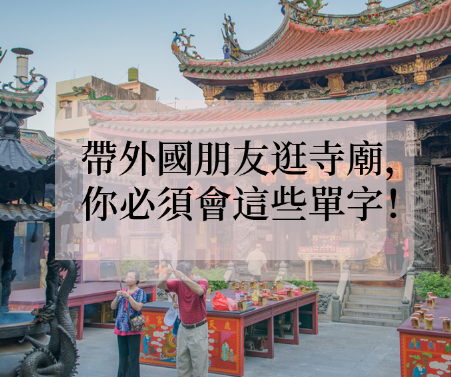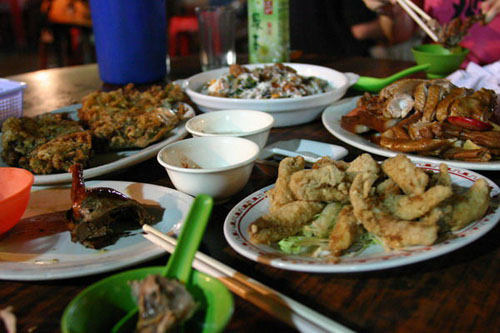Bob 的美国朋友 Henry 飞来台湾找他玩了! Henry 对台湾文化非常好奇,希望能体验到最道地的台湾生活,Bob 于是决定带他到台北艋舺的龙山寺一探究竟!
(At the entrance of Longshan Temple)
(在龙山寺的入口)
Henry: Bob, this temple is magnificent! It’s huge!
Henry:Bob,这座庙好雄伟!好大啊!
Bob: Yes, and it has more than 280 years of history! Come on, let’s go inside.
Bob:是呀,它的历史超过 280 年哦!来吧,我们进去里面。
(Inside the temple)
(在庙里)
Henry: Bob, what are those sticks that everyone has in their hands?
Henry:Bob,大家握在手里的那根东西是什么?
Bob: They’re called incense sticks. The worshippers burn them and put them into the incense burner.
Bob:那叫做香。信徒会烧香然后把它放进香炉里。
Henry: And those square yellow pieces of paper? They looks like post-its.
Henry:那那些方形的黄纸呢?看起来好像便利贴。
Bob: Hahah, It’s called joss paper–money for the spirits. The worshipers burn them for the spirits so that they have money to use in the afterlife.
Bob:哈哈,那叫做纸钱,给鬼魂的钱。信徒烧纸钱给鬼魂,这样祂们在另一个世界才有钱可以用。
Henry: Oh, I’m glad you’ve told me! Otherwise I might have used one as a post-it…
Henry:噢,幸好你有告诉我,不然我可能会把它拿来当便利贴用…
temple (n.) 寺庙
temple 在此泛指「寺庙」,除此之外也可以用来指「太阳穴」。对佛教徒来说,通常供奉神民的地方称做「寺庙」(temple),而对于道教徒来说则叫「宫」(shrine)。
My grandmother went to the local temple every week.
我阿嬷每个礼拜都会去庙里。
I always put some peppermint oil on my temples when I feel sleepy.
我想睡的时候总会在太阳穴擦一点薄荷油。

incense stick (n.) 香柱
incense 的意思是「香」,是一种泛指的说法,指的可能是粉状的或是棒状的香。讲仔细一点,台湾庙宇常见的那种一根根的香柱是 incense stick ,stick 意指「枝条」。补充插香的「香炉」则为 incense burner。
More and more temples have stopped using incense in order to protect the environment.
越来越多寺庙为着环保不再烧香。
worshipper (n.) 信徒
worship 为动词,意思是「信仰;敬拜」,worshipper 则是指「信仰者;信徒」,并不局限于特定宗教的信徒。
The worshippers gather at the church every Sunday.
信徒每周日在教会聚集。
joss paper (n.) 纸钱
joss 的意思是「神像;佛像;偶像」,因此 joss paper 是指「纸钱」。补充:「香柱」除了前面提的 incense stick,亦可用 joss stick 指称。
Once, I saw someone stick joss paper on the wall as a decoration.
我曾经看过有人在墙上贴纸钱当装饰。 (真人真事,小 V 在欧洲见到的… )
Henry 又注意到了另一件事 …
Henry: Hey Bob, I see many people drawing wooden sticks over there. What are they doing?
Henry:诶 Bob,我看那里有很多人在抽木棒,他们在做什么?
Bob: They’re drawing fortune sticks. Do you want to try it?
Bob:他们在抽神签。你想试试吗?
Henry: Sure!
Henry:好啊!
Bob: Okay then, hold these first.
Bob:没问题,那你先拿好这些。
Henry: What are these two blocks of wood for?
Henry:这两块木头是干嘛的?
Bob: They’re called divination blocks. First, you have to introduce yourself, then you ask god a question and throw the divination blocks. They’ll tell you if god allows you to draw a fortune stick or not.
Bob:它们叫做筊杯。首先你必须自我介绍,然后问神明一个问题,再把筊杯掷出去。它们会告诉你神明是否愿意让你抽灵签。
Henry: Cool! (introducing himself) I want to know if I will get a girlfriend this year. (throwing out the divination blocks)
Henry:酷! (自我介绍) 我想知道我今年会不会有女朋友。 (丢出筊杯)
Bob: Lucky you! You’ve got a Shing-bwei, which means god has allowed you to draw a fortune stick. After you draw your stick, you’ll get a slip of paper. The poem printed on it will answer your question.
Bob:你真幸运!你得到了一个圣杯,意思是神明允许你抽灵签。你抽好签之后会得到一张纸。纸上印的诗会回答你的问题。
Henry 真是太幸运了!跟着小 V 复习新字吧!
draw (v.) 抽
在文中,draw 指的并非「画画」,而是指「抽」的这个动作,如:draw lots (抽签)。
My sister and I often draw lots to decide who will do the dishes.
我姐和我抽签决定谁要洗碗。
fortune stick (n.) 神签
fortune 为名词,意指「财富;运气」,因此 fortune stick 就是指用来求问吉凶祸福的占卜工具,也就是「神签」。
Drawing fortune sticks is a traditional fortune-telling practice in East Asia.
抽神签是东亚地区一个传统的占卜仪式。
divination blocks (n.) 筊杯
divination 意思是「占卜;算命」,block 则是指「块状物」,divination blocks 直翻就是「占卜用的块状物」,在此指的就是庙里两块红色半月形的「筊杯」。而「掷筊」动词通常搭配 throw。
The worshipper has been throwing divination blocks for an hour, but god still won’t answer his question.
那位信徒已经掷了一小时的筊杯,但神明仍旧不愿回答他的问题。
introduce oneself (phr.) 自我介绍
introduce 意指「介绍」,常见后头接 myself、yourself 等等反身代词,代表「介绍我自己」、「介绍你自己」等等。
The teacher asked us to introduce ourselves.
老师要我们自我介绍。







